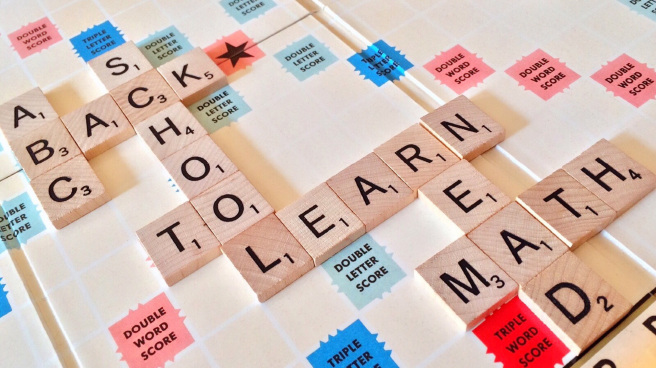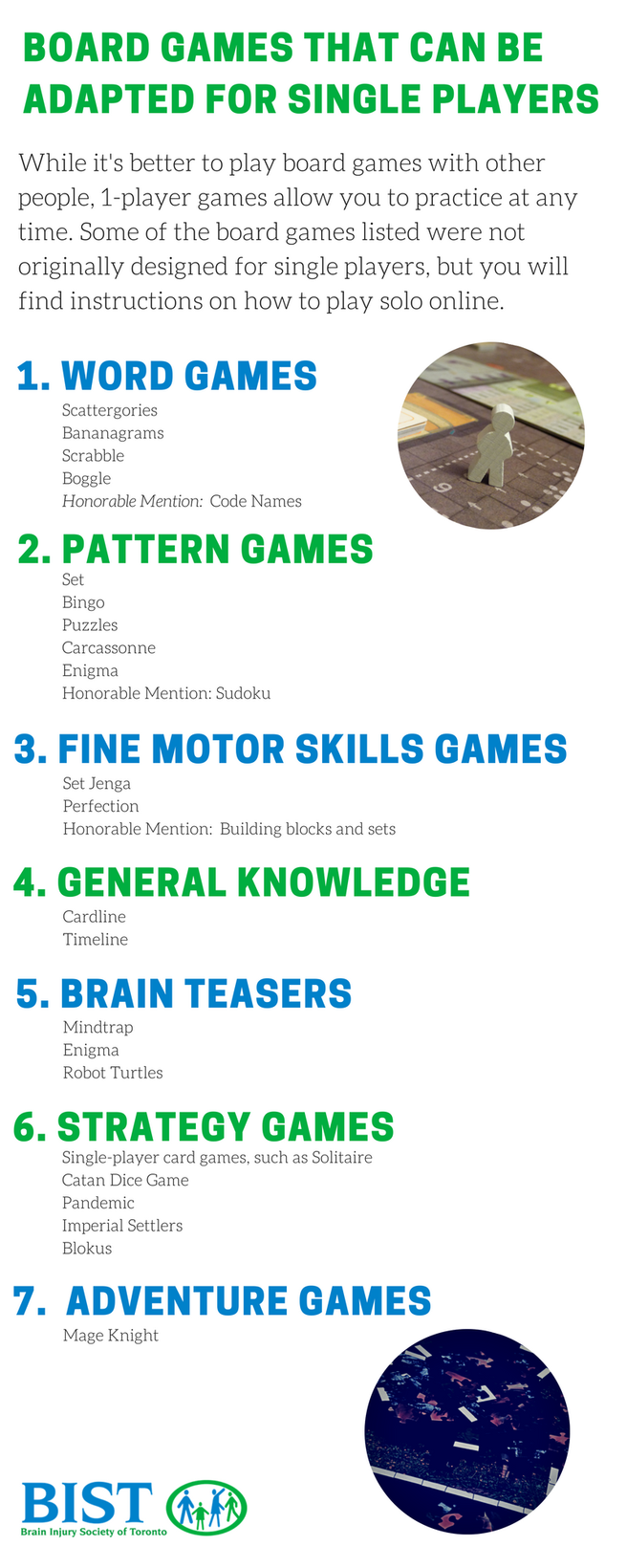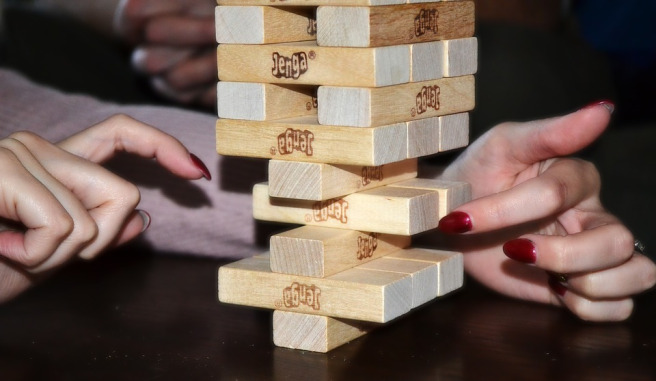
BY: ALISON
Without lights and sounds associating with gaming apps or consoles, board games are less stimulating than other activities and require very little physical exertion. They were among very few things that I was able to do during the acute phase of my injury.
Board games are great for brain training and reconditioning. In fact, I suggested board games as a mentally challenging activity in my previous article, Having a brain injury increases your chances of dementia: here are activities that can help and are great for encouraging and facilitating social interaction.
After my injury, I wanted to avoid my friends, because conversations were exhausting and difficult to follow. But playing board games with friends was perfect. I got the social connection that I needed without having to engage in deep conversation. Also, the pressure and focus was off of me, since everyone’s attention was directed towards the game.
Not to mention, board games are super fun (heck, they’ve withstood the test of time), provide hours of distraction, and can be played solo. I didn’t need assistance or company for entertainment.
The selection of board games is endless, so there’s always something new to try.
How to challenge yourself using board games:
The following guidelines will teach you how to train your brain by gradually increasing the difficulty of your board games. The steps should be tackled one at a time, moving forward only when you are confident with the previous step. Be patient with yourself, as you may need weeks or months before advancing. Regular practice and repetition are the keys to success here.
Step 1:
In the beginning, focus only on learning and following the rules of the game. Don’t worry about speed or trying to win. Simply learn the basics of how to play. Play as many times as needed to become familiar with it. This will improve your learning and memory skills.
Step 2:
If you’re playing a game by yourself, then play with the goal of improving your result, speed, or efficiency. For example, depending on the game, you could try to collect more points, finish the game more quickly, or finish the game using fewer moves. Work through one objective at a time.
If you’re playing a game with others, figure out one strategy that will help you win the game. However, the focus should be on discovering and practicing the strategy, not on winning. This promotes problem-solving skills. If you’re stuck, ask the person you’re playing with to teach you their approach. Once you’re familiar with the first one, see if there are other strategies that could help you win the game. Determine which one(s) are the most effective. Eventually, the goal is to use a combination of strategies at the same time. This is great practice for multi-tasking skills. You might even start winning more games.
Step 3:
Now that you’ve figured out how you like to play the game, it’s time to pay attention to how your opponents are playing. See if they make decisions differently from you, figure out what their strategies are, and try to predict their next moves. Compare their approach to your own, see which one is more effective, and learn from them. Furthermore, think of new tactics that will prevent your opponents from winning. This will exercise your analytical and critical-thinking skills.
Finally, try to improve your chances of winning. You will likely need to change your plan multiple times throughout a game in order to adapt to new scenarios/problems and to circumvent your opponents. Once you become really good at the game, start these steps over again with a different game.

Board games that can be adapted for single players:
While it’s better to play board games with other people, one-player games allow you to practice at any time. Some of the board games listed were not originally designed for single players, but you will find solo variant instructions online. The following suggestions vary widely in difficulty and cost.
Word Games
Scattergories
Bananagrams
Scrabble
Boggle
Honourable mention: Code Names – Although this game cannot be played solo, it is, in my opinion, the best word-focused, brain training game. It allows you to practice communication, word associations, and different thought processes. The cards could even be used separately for reading and comprehension.
Pattern Games
- Set – This simple card game is really good for unique pattern-recognition, concentration, and different lines of thinking.
- Bingo – even more fun if there are small prizes to be won.
- Puzzles
- Carcassonne – No language skills are required to play this tile-based puzzle / strategic game.
- Enigma – Includes fragment puzzles and 3-D puzzles among other challenges.
Honourable mention: Sudoku – This is not a board game, but it’s great for figuring out number patterns. The difficulty ranges from easy to very hard. Also, you can find free printable sudokus online.
Fine Motor Skills Games
- Jenga – Try Giant Jenga if fine motor skills are an issue.)
- Perfection – There’s the original version with 25 pieces and a more affordable version with only 9 pieces. This game also has a pattern-matching/puzzle component to it.

Honourable mention: Building blocks and sets (e.g wooden blocks, jumbo cardboard blocks, Mega Bloks, Lego, K’Nex, etc.) – These aren’t board games, but they’re great for stimulating creativity.
Memory Games
- There are many different versions of matching card games that were designed to practice memory skills. See here for more information, you could also play this type of memory game using a regular deck of cards.
General Knowledge Games
- Cardline – Variations include: Globetrotter, Animals, Dinosaurs
- Timeline – Variations include: Diversity, Historical Event, Inventions, Music and Cinema, Science and Discoveries
Problem Solving or Brain Teaser Games
- Mindtrap – A game with many riddles, brain teasers, and picture puzzles.
- Enigma – This includes math-based and various puzzle-based challenges.
- Robot Turtles – This is a kids game that can be used to practice logical thinking, planning ahead, and improving efficiency. It was originally designed to introduce programming fundamentals to kids.)
Strategy Games
- Single-player card games, such as Solitaire (played with a regular deck of cards, Instructions on how to play can be found here) or Friday – a survival / battling card game.
- Catan Dice Game – a settlement-building game was designed for one or more players.
- Pandemic – The object of this game is to treat and eradicate diseases before they spread out of control.
- Imperial Settlers – This empire-building game was designed for 1 or more players.
- Blokus – This tile-placement game does not require language skills.
Adventure Games
- Mage Knight – This is the most complex and expensive board game I’ve listed in this article. It is a strategic game that is based in an adventure and story. The game includes instructions for solo play, but there are many pieces and rules, so I suggest watching YouTube videos, HERE and HERE that help explain them.
My Favourite Games Stores:
- Walmart
Walmart doesn’t have a large selection of unique games, but every now and then they have great sales on classic games. I purchased the following games for less than $20 each while they were on sale: Scattegories, Bingo, puzzles, Jenga, Perfection, Sudoku books, and decks of playing cards.
This is my favourite board games store. They have an extensive selection, competitive prices, and incredibly knowledgeable staff. They have a storefront at 518 Yonge Street, Toronto, and an online store as well.
Although their store is wheelchair accessible, their games room for events is not. If you want to avoid a crowd, go before 3 pm or shop online. I suggest ordering your games online and then picking them up at the store to save on shipping. If transportation is an issue, shipping is a flat rate of $8.95 per order. Shipping is free for orders of $150 or more.
FEATURED IMAGE: Pixabay via Pexels
Mind Yourself with Alison’ is a collection of self-help tips, research, and personal experiences dedicated to helping people thrive after brain injury (or other trauma). Check out Alison’s other BIST Blog articles Women and Brain Injury: What you need to know and How to be a Good Friend to a Survivor.
Filed under: Mind yourself with Alison, neuroplasticity, Uncategorized Tagged: board games, Brain injury, Mind Youself with Alison
![]()




